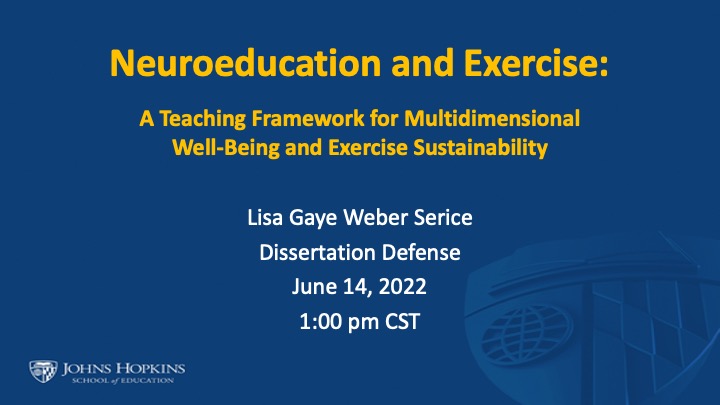Neuroeducation is an emerging field at the intersection of the science of learning and, you guessed it, education! What’s super exciting to me is that creative exploration done at this intersection has the potential to surpass education reform and instead transform teaching and learning processes. And when I say “teaching and learning,” I’m not merely referring to K-20 formal education in brick-and-mortar schools. I’m talking about every place imaginable where people learn over a lifespan—including the gym and exercise classes!
The Neuroeducation Initiative at Johns Hopkins University was founded in 2008 through a collaborative effort of the School of Education and the School of Medicine’s Brain Science Institute. It’s become an international leader in the growing field of neuroeducation and was among the first university initiatives to foster interdisciplinary collaborations to address the intersection between education and basic and applied science.
My interests lie at the intersection of neuroscience and physical activity (exercise and the body’s movement). I’m specifically interested in embodied enactive cognition—understanding how we can creatively leverage what we’ve learned about the mind-brain-body-environment connection to transform how we think about, teach, and participate in various physical activities. On a social level, I wonder how changing our views on physical movement might contribute to human flourishing by extending health spans and improving quality of life.
My dissertation research (three years, five chapters, two literature reviews, two empirical studies, and 365 pages, but who’s counting??!!) revolved around creating, piloting, and prototyping a neuroeducation initiative directed at fostering exercise sustainability and normalizing physical movement for multiple dimensions of well-being. Full disclosure—a dissertation is not quite the light vacation reading you’d want on the beach. However, in small reading doses, it’s palatable. If you’re curious, the pdf is free and downloadable at this link: https://jscholarship.library.jhu.edu/bitstream/handle/1774.2/67439/SERICE-DISSERTATION-2022.pdf?sequence=1&isAllowed=y
